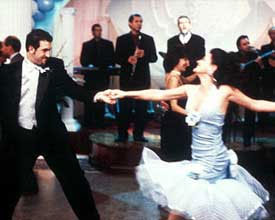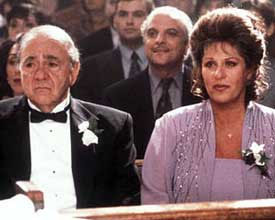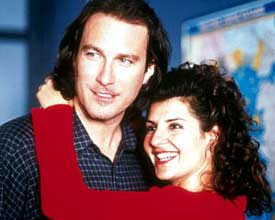The Big Fat Ethno-Indie that could
Are we to expect more Hollywood films riding the Diaspora coat tails (and wedding organza train) after MY BIG FAT GREEK WEDDING?
"Mirella Bontempo is a Film Studies Graduate from Concordia University and also has a BA from McGill.
 The
hoopla (insert here pseudo-clever Hellenic references such as Opa!) surrounding
the phenom that is My Big Fat Greek Wedding, got generated from its premise
as the ultimate universal comedy. The word-of-mouth success, based on a story
about writer-actor Nia Vardalos’ family is no less discussed, as is
the behind-the-production story. It has no pretensions other than being an
inoffensive slapstick though the Mother Country seriously hates misrepresentations
of its culture by those ‘bastardized’ immigrants ‘stuck
with 1950s values’. This ‘embarrassing’ culture does not
belong to idealized Hellenic mores. The film depicts caricatures to the chagrin
of humorless anti-defamation types who’d like to have a moratorium on
parodies.
The
hoopla (insert here pseudo-clever Hellenic references such as Opa!) surrounding
the phenom that is My Big Fat Greek Wedding, got generated from its premise
as the ultimate universal comedy. The word-of-mouth success, based on a story
about writer-actor Nia Vardalos’ family is no less discussed, as is
the behind-the-production story. It has no pretensions other than being an
inoffensive slapstick though the Mother Country seriously hates misrepresentations
of its culture by those ‘bastardized’ immigrants ‘stuck
with 1950s values’. This ‘embarrassing’ culture does not
belong to idealized Hellenic mores. The film depicts caricatures to the chagrin
of humorless anti-defamation types who’d like to have a moratorium on
parodies.
 The
marketing has been relentless. For instance the Sigma (Es) on the poster’s
title personify Souflaki signposts everywhere that the mainstream considers
bonafide. During the screening’s previews, a rough-cut trailer of Mambo
Italiano, the film adaptation of Steve Galluccio’s play, premiered though
concurrently shooting in Montreal. It stars Newfoundland’s Mary Walsh
as a black-donning Mediterranean merry widow archetype equipped with an over-the-top
Italian accent; an affectation she picked up from TV. Not even Brooklynite
Paul Sorvino could help her tone it down because he is busy dancing the Calabrian-hybrid
of La Tarantella (the Magna Grecia in origin spider-inspired dance) in a vine-ornate
backyard. The connection is complete. There is a market for this sort of spicy
romantic comedy genre. The transition to film demands compromise. Mambo’s
original working class textile district setting moved to the suburban homes
with glittery, gaudy vases. With My Big Fat Greek Wedding, Winnipeg becomes
Chicago’s Greektown though shot in Toronto’s similarly named ghetto
on Danforth. By stripping away the context, the film loses what-could-have-been.
Winnipeg offers an avant-garde film collective, climate-inspired humour and
rich with hyphenated-Canadian writers including Greek.
The
marketing has been relentless. For instance the Sigma (Es) on the poster’s
title personify Souflaki signposts everywhere that the mainstream considers
bonafide. During the screening’s previews, a rough-cut trailer of Mambo
Italiano, the film adaptation of Steve Galluccio’s play, premiered though
concurrently shooting in Montreal. It stars Newfoundland’s Mary Walsh
as a black-donning Mediterranean merry widow archetype equipped with an over-the-top
Italian accent; an affectation she picked up from TV. Not even Brooklynite
Paul Sorvino could help her tone it down because he is busy dancing the Calabrian-hybrid
of La Tarantella (the Magna Grecia in origin spider-inspired dance) in a vine-ornate
backyard. The connection is complete. There is a market for this sort of spicy
romantic comedy genre. The transition to film demands compromise. Mambo’s
original working class textile district setting moved to the suburban homes
with glittery, gaudy vases. With My Big Fat Greek Wedding, Winnipeg becomes
Chicago’s Greektown though shot in Toronto’s similarly named ghetto
on Danforth. By stripping away the context, the film loses what-could-have-been.
Winnipeg offers an avant-garde film collective, climate-inspired humour and
rich with hyphenated-Canadian writers including Greek.
 Often
one hears “film your family” from extra-members expecting colourful
ethnic dysfunction as an end-result. Do what you know also applies. Vardalos’
new project includes My Big Loud Greek Family TV CBS sit-com (this time with
Greek actors she insists) and a Latin-tinged script Connie and Carla Do LA.
Like it or not, she’s already typecast as the apolitical Southern European
equivalent of Hanif Kureishi. But at least she’s got work, exploiting
her family’s rich fodder. Plus, the TV networks are always hounded for
not being culturally diverse.
Often
one hears “film your family” from extra-members expecting colourful
ethnic dysfunction as an end-result. Do what you know also applies. Vardalos’
new project includes My Big Loud Greek Family TV CBS sit-com (this time with
Greek actors she insists) and a Latin-tinged script Connie and Carla Do LA.
Like it or not, she’s already typecast as the apolitical Southern European
equivalent of Hanif Kureishi. But at least she’s got work, exploiting
her family’s rich fodder. Plus, the TV networks are always hounded for
not being culturally diverse.
 To
discern big fat clichés from essential truths, I decided to sit in
the theatre with Greeks. Most resonating were the flashbacks to pedantic Greek
school and the typical “immigrant child” syndrome where in the
voice-over Nia Vardalos describes her young self (Fatoula Portokalos) as a
“swarthy kid with sideburns.” Lunchroom taunts from the blonde
kids eating their white toast sandwiches mocking Fatoula’s greasy, smelly
ethno-grub as “Moose-kaka.” The rest of the journey that Fatoula
embarks on, is one where the dilemma is to assimilate and break away with
her parents’ arcane and misogynistic stranglehold over her life. The
only escape for the trapped ugly ducking, who sacrificially toils at the family
restaurant, is a makeover that leads to the Kouros coming to the rescue. If
we believe the message of the film, a value most immigrants hold on to is
breeding over an education. (In truth, Nia studied drama — far riskier
than some computer course and familiar secretarial territory). These values
may seem anachronistic since what most immigrants have in common is the expectation
of a higher education for their children. That includes their daughters, in
spite of some lingering gender bias that may occur in some families that should
not be generalized to an entire culture. Fatoula’s filotimi (honour)
is at stake when she sleeps over at her boyfriend’s, causing anguish
with her father (somewhat neutralized by the enlightened wife who has reconciled
with premarital sex) while her brother’s coming and goings are unquestioned.
To
discern big fat clichés from essential truths, I decided to sit in
the theatre with Greeks. Most resonating were the flashbacks to pedantic Greek
school and the typical “immigrant child” syndrome where in the
voice-over Nia Vardalos describes her young self (Fatoula Portokalos) as a
“swarthy kid with sideburns.” Lunchroom taunts from the blonde
kids eating their white toast sandwiches mocking Fatoula’s greasy, smelly
ethno-grub as “Moose-kaka.” The rest of the journey that Fatoula
embarks on, is one where the dilemma is to assimilate and break away with
her parents’ arcane and misogynistic stranglehold over her life. The
only escape for the trapped ugly ducking, who sacrificially toils at the family
restaurant, is a makeover that leads to the Kouros coming to the rescue. If
we believe the message of the film, a value most immigrants hold on to is
breeding over an education. (In truth, Nia studied drama — far riskier
than some computer course and familiar secretarial territory). These values
may seem anachronistic since what most immigrants have in common is the expectation
of a higher education for their children. That includes their daughters, in
spite of some lingering gender bias that may occur in some families that should
not be generalized to an entire culture. Fatoula’s filotimi (honour)
is at stake when she sleeps over at her boyfriend’s, causing anguish
with her father (somewhat neutralized by the enlightened wife who has reconciled
with premarital sex) while her brother’s coming and goings are unquestioned.
Another tenet of the film, is how intra-breeding is so dear to this culture (well, at least to the Portokalos / Vardalos clan and other religious-defined ethnicities). The would-be groom is a bland, white, Xeno, Ian Miller (John Corbett). Gus Portokalos makes inference to the classical ethnocentrism ancient Greeks held for bar-bar stuttering Barbarians: “When my people were writing philosophy, your ancestors were still swinging from trees”. This corrective,topsy-turvy, ethnic superiority rarely is captured on film and when it is, it is derided as such. It transforms Gus's national pride about Greek contributions (the amateur linguist in the shell of a poor illiterate immigrant) into some pathology.
The real Ian, pudgier actor Ian Gomez (Javier in Felicity) plays the best man, losing the Adonis role to Corbett. Gomez is a Puerto Rican Jew of Greek extraction from New York – a Juan Epstein of sorts. The complexities such as this get polarized and whitewashed. This, in spite of Greek-American Hollywood mover-cum-shaker Rita Wilson’s (real name Margerita Ibrahimoff) involvement with turning the one-woman monologue skit into a $5 million budget film (subsequently grossing over $147 million).
 The
idea that ethnicity is laughable isn’t new to spectatorship studies.
Accuracy is not the goal. We have seen negative stereotypes and the ennobling
corrective or positive stereotypes surfacing recently. The polarization is
one where the nobler white hegemonic culture, to which the smug audience member
belongs to intellectually regardless of ethnicity, compared to the nutty,
jovial Other. Ian’s affluent parents don’t kvetch regarding his
conversion to Greek Orthodoxy. The urbane Millers remain unscathed from their
Top-Down status, if anything they embody the WASPified frigid and unearthy
cliché.
The
idea that ethnicity is laughable isn’t new to spectatorship studies.
Accuracy is not the goal. We have seen negative stereotypes and the ennobling
corrective or positive stereotypes surfacing recently. The polarization is
one where the nobler white hegemonic culture, to which the smug audience member
belongs to intellectually regardless of ethnicity, compared to the nutty,
jovial Other. Ian’s affluent parents don’t kvetch regarding his
conversion to Greek Orthodoxy. The urbane Millers remain unscathed from their
Top-Down status, if anything they embody the WASPified frigid and unearthy
cliché.
The kitsch pièce-de-resistance always emanate from the mise-en-scène. What’s kitsch for one person is another person’s sofa and wedding. Though subtle ones like tins of Caprices cigarette wafers, buckets of brine-soaked olives, cobalt Grecian urn reproductions and Papa nonchalantly carrying the sacrificial skinned lamb through the patio slide doors, look like normal household staples and imagery. On the other hand, the porch’s Doric columns, blue and white flag motif on the garage door, glue-gunned seashell lampshade and heirloom jewelry box from their native island Mykonos, were far-fetched. As if anyone ever emigrated from that pleasure garden. Traditional emigration territories like Cefalonia and Macedonia were decidedly too foreign for audience members, some producer thought.
Customs, like uttering the blessing Tou-Tou culminated into a spit for that heightened effect. Gus’ Windex all-purpose cure-all for lesions induces cheap laughter and the1970s Windex aerosol can a nice prop. A stereotype like this reveals Old Country folk wisdom and practice that includes bleach, ammonia, baking soda and other household Amish-like herbal remedies, concocted way before impressionable North Americans dabbled in Ayurvedic medicine.
Though Vardalos and Wilson lament the lack of Greek roles or roles for non-descript Other actors, one may glance at the Greek-Australian scene. Many independent films by Greek-Aussie directors and writers like Ana Kokkinos’ Head On (1998) and Beware of Greeks Bearing Arms are the antitheses of My Big Fat Greek Wedding (MBFGW). The television sit-com on Wogs, Acropolis Now (1989 - 1992) was situated in Melbourne, heralded as “the second biggest Greek city after Athens”. The Greek cast includes Zoe Carides. Her sister Gia Carides (unrecognizable as the peroxide blonde Liz in Strictly Ballroom) plays slutty, big-haired cousin Nikki in MBFGW. Her name is hardly ubiquitous this side of the Pacific where her fellow Oz husband Anthony LaPaglia gets relegated as mobster/cop in Hollywood while he lands meatier roles such as Lantana (2001) in Australia.
 Many
unjustly whine about the lack of Greek actors (i.e. where was Olympia Dukakis?).
That argument is valid in the one-dimensional portrayal of the Yaya: the demented
and Mediterranean gnarled granny, who believes the Ottoman War never ended
(paralleling the lingering resentment), didn’t speak Greek - not even
token Greek unlike other cast mates. Naysayers neglect Michael Constantine
(Gus), Stavroula Logothettis (Athena) and countless Vardalos’ relatives
she cast as extras. Andrea Martin (real name Papazian) as the vain, fatalistic
and crafty Aunt Voula happens to be in the ethnic and religious vicinity as
an Armenian. The norm for thespians (the classical term hypokrite) is to change
their multi-syllabic names. But John Cassavetes and his art director cousin
Phelan Papamichael didn’t. Hell, neither did John Stamos nor the defiantly
phonetically challenging Melina Kanakaredes. Then again, compare the family
talent and fortunes of the Sheens and the lone Estevez.
Many
unjustly whine about the lack of Greek actors (i.e. where was Olympia Dukakis?).
That argument is valid in the one-dimensional portrayal of the Yaya: the demented
and Mediterranean gnarled granny, who believes the Ottoman War never ended
(paralleling the lingering resentment), didn’t speak Greek - not even
token Greek unlike other cast mates. Naysayers neglect Michael Constantine
(Gus), Stavroula Logothettis (Athena) and countless Vardalos’ relatives
she cast as extras. Andrea Martin (real name Papazian) as the vain, fatalistic
and crafty Aunt Voula happens to be in the ethnic and religious vicinity as
an Armenian. The norm for thespians (the classical term hypokrite) is to change
their multi-syllabic names. But John Cassavetes and his art director cousin
Phelan Papamichael didn’t. Hell, neither did John Stamos nor the defiantly
phonetically challenging Melina Kanakaredes. Then again, compare the family
talent and fortunes of the Sheens and the lone Estevez.
If Vardalos and Wilson complain about lack of Greek characters or roles for
Greek actors on promotional tours on national soapboxes, they should practice
affirmative action in their own production. Regardless of the number of on-screen
Greek actors in MBFGW, the other side of the camera lists only one Hellenic
name as assistant-director. Surely, there are Greek-Canadians and Greek-Americans
in film schools and the film industry’s unions. Montreal’s Ioanna
Vriniotis just sold her short film Zoe to US’s Independent Film Channel
and credits the deal to MBFGW as impetus. One of the four production houses
of MBFGW, Tom Hanks’ Playtone invested in this Shot-in-Hollywood North
film. Hanks, husband of Rita Wilson, was the spokesperson for that forgotten
Screen Actors Guild strike regarding the lack of residual payments for minor
Hollywood commercial actors.
One can infer that MBFGW is empowering and re-appropriating
tacky is good. The tagline should read: Take back the big hair. Weddings are
by nature loud as seen in any episode of TLC’s A Wedding Story. One
recalls the success of that other “quirky” aussie flick about
aging spinsters Muriel’s Wedding (1994). Usually film depiction of in-laws
discriminating the spouse-to-be often tantamount to narratives about clashing
values that minorities stubbornly harbour such as Ang Lee’s Wedding
Banquet (1990). Stock characters and stereotypes abound in East is East (1999)
where the Big Fat Arranged East Pakistani/Bangladeshi Weddings were properly
contextualized in 1970s Salford – the fish and chips shop replaces the
Gyro diner. As seen in the promotional trailer of MBFGW, this specified wedding
could be attributed to all tribes and the all-encompassing target markets.
The Delphic Oracle interprets the innards and foresees Graeco-Roman Toga parties
to be on the rise. Ronald Gross, the author of Socrates’ Way, a motivational
speaker and a Socrates impersonator, walks around Manhattan in a Taigon dispensing
Sophia in that polis’ agora.